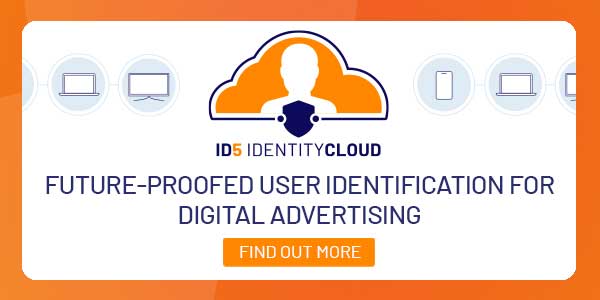By Mathieu Roche, co-founder and CEO of ID5
This article is sponsored by ID5.
Identity is making lots of headlines. What used to be a niche topic is getting a lot of attention now that the means to it are at risk. The good news is that, as the cookie panic subsides, it’s giving way to an open-mindedness toward the future of identity across the advertising industry. All of a sudden, there’s a willingness to understand how user identification will work when traditional identification methods are no longer available.
While we’re almost in that future, it’s held back by the present perceived complexity of identity – and a number of factors are making it harder to crack:
- Fragmentation and lack of unity. Ad tech platforms use different methods to identify users in different environments: a combination of cookies (on the web), MAIDs (in mobile applications) and IP addresses (on CTV).
- Privacy expectations. Digital advertising has to comply with growing regulations related to the collection and processing of user data. Some of the old practices that we have deployed to identify users will no longer be compliant with privacy requirements (or already aren’t, depending on the region).
- Too many players on the board. The deprecation of cookies and MAIDs has pushed many media and data platforms to create their own identity offerings. But often their methods don’t have an overarching approach to identity and tend to serve specific use cases that are closer to their business and clients. This proliferation is creating more confusion and further unnecessary fragmentation.
If the industry wants to transition to a future-proofed identification infrastructure, we need to simplify today’s system and align with some common principles.
Consolidation
Advertisers expect to have a holistic view of the consumer to apply people-based marketing strategies. To get there, the industry needs to adopt a universal method to identify and address users across environments and devices, not just one-off alternatives to cookies and MAIDs.
Privacy focus
Consumers deserve transparency and control over how their data is collected, processed and used by brands, advertisers and publishers. Over time, the industry has created its own bad reputation with inappropriate data collection and management practices. To regain consumers’ and regulators’ trust, we need to leverage technologies that follow the highest privacy standards. That means meeting the consumer and regulatory expectations of today and using tools that can evolve in response to tomorrow’s.
Common value
With time, the industry consolidate around identity solutions that achieve scale and adoption. Those that forward the common value of identity instead of focusing on specific use cases have better chances to rise to the top and become industry standards.
Introducing IdentityCloud
These are the principles we followed to create IdentityCloud, a comprehensive, efficient and privacy-compliant solution to identify users in all digital advertising environments. IdentityCloud has been built with the whole digital advertising ecosystem in mind, including consumers. It enables publishers and brands to increase addressability, operate more efficiently and monetize their assets while protecting users’ privacy.
There is no shortage of choice when it comes to identity solutions. No matter what Google says about its cookie deprecation time frame, time is still limited and so are your resources. Make sure that the partners you choose know how to navigate the complexities of an everchanging ecosystem, and that they have your best interests – and the industry’s – in mind.















